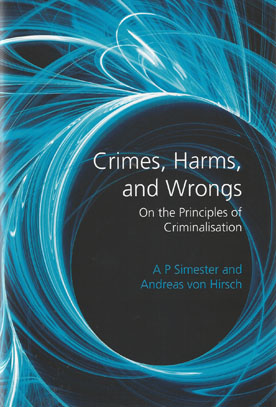
When should we make use of the criminal law? Suppose that a responsible legislature seeks to enact a morally justifiable range of criminal prohibitions. What criteria should it apply when deciding whether to proscribe conduct?
Crimes, Harms and Wrongs is a philosophical analysis of the nature, significance and ethical limits of criminalisation. The authors explore the scope and moral boundaries of harm-based prohibitions, proscriptions of offensive behaviour and ‘paternalistic' prohibitions aimed at preventing self-harm.
Their aim is to develop guiding principles for these various grounds of state prohibition, including an analysis of the constraints and mediating factors that weigh for and against criminalisation. Both authors have written extensively in the field.